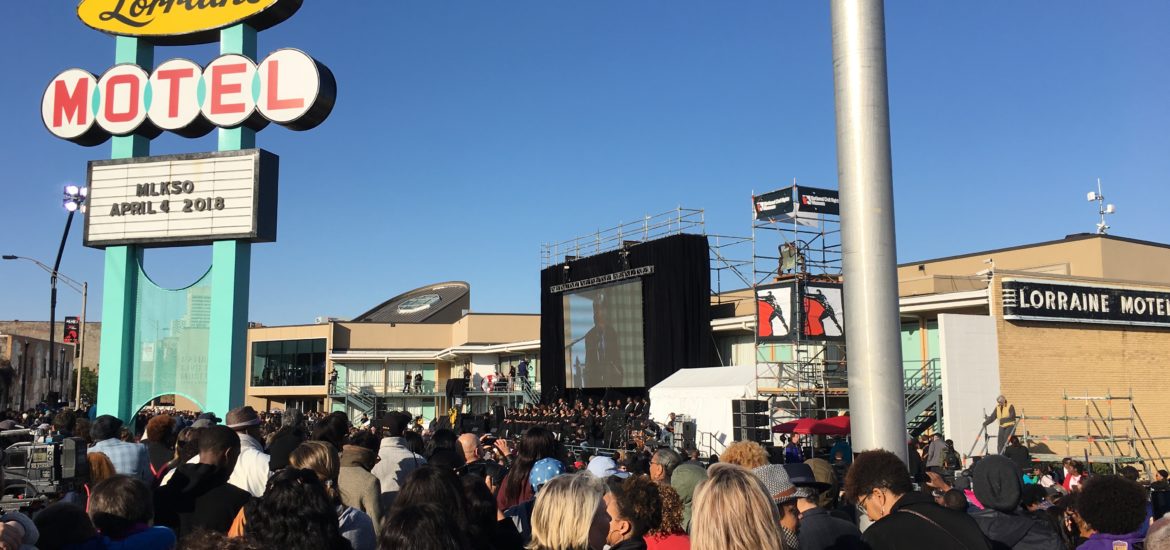On April 4, 1968, Martin Luther King Jr was assassinated at the Lorraine Motel in Memphis, Tennessee, at the age of 39 years old. The night before he gave a phenomenal speech which became known as “The Mountaintop Sermon.” It was prophetic in that he described many of the threats against his life. However, he also recounted many great moments in world history and how if he had to pick a time to live in all of that history he would choose the time he was living in.
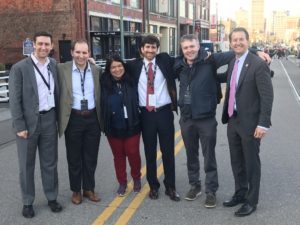 By the end of the speech, revisiting all the progress he had seen through the civil rights movement, he said, “I don’t know what will happen now. We’ve got some difficult days ahead. But it doesn’t really matter with me now, because I’ve been to the mountaintop. And I don’t mind. Like anybody, I would like to live a long life. Longevity has its place. But I’m not concerned about that now. I just want to do God’s will. And He’s allowed me to go up to the mountain. And I’ve looked over. And I’ve seen the Promised Land. I may not get there with you. But I want you to know tonight, that we, as a people, will get to the promised land! And so I’m happy, tonight. I’m not worried about anything. I’m not fearing any man! Mine eyes have seen the glory of the coming of the Lord!”
By the end of the speech, revisiting all the progress he had seen through the civil rights movement, he said, “I don’t know what will happen now. We’ve got some difficult days ahead. But it doesn’t really matter with me now, because I’ve been to the mountaintop. And I don’t mind. Like anybody, I would like to live a long life. Longevity has its place. But I’m not concerned about that now. I just want to do God’s will. And He’s allowed me to go up to the mountain. And I’ve looked over. And I’ve seen the Promised Land. I may not get there with you. But I want you to know tonight, that we, as a people, will get to the promised land! And so I’m happy, tonight. I’m not worried about anything. I’m not fearing any man! Mine eyes have seen the glory of the coming of the Lord!”
The next day, he was shot and killed.
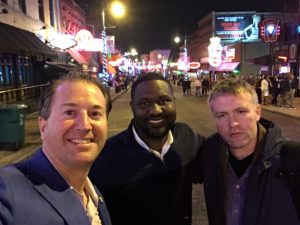
And so, 50 years later, we came to Memphis to commemorate the passing of this great man who led a movement that changed this country and changed the world, and moved us closer to the Promised Land. He called on us to live up to the dreams of this nation’s founders and told us he had a dream too. He outlined it for us. We aren’t there yet in fulfilling his full vision, but we’ve sure made a lot of progress on the way
We had a full agenda here in Memphis. I arrived on Monday evening, April 2. Joining with group of friends, who all came here for a purpose, we started with a casual dinner at The Second Line in midtown, then we headed down to Beale Street to take in some blues and a few libations. My friend Joe Lindsley and I then headed to another bar in midtown, Bar DKDC – a hipster joint that had a live Grateful Dead style band. A fun first night.

The next day we were privileged to be able to have a private lunch at Ernestine and Hazel’s, a classic establishment in downtown Memphis. They don’t normally open until 5pm, but my friend Joe had arranged a private lunch there for us and they cooked us up some delicious burgers and then gave us a tour, including of the floor above, where there was once a longstanding whore house – one that Ray Charles used to frequent. It still has a piano he used to play while there. During lunch, we heard from Josh Roberts of Southern Growth and the work he and others in the medical community are doing to provide low-cost (and in some cases, free) health care for those living in poverty in Memphis.
After lunch we then headed to the MLK50 conference, with the theme of “gospel reflections from the Mountaintop.” It was a gathering of evangelical leaders, mostly from across the South, coming together to address issues of racial reconciliation – including urging church leaders to tackle racial injustice head-on. It was a moving experience, listening to so many of them, mixed in with some really great music. Our friend Philip Bethancourt was largely responsible for putting together this entire conference, which thousands of people from all walks of life attended. Truly a remarkable two-day gathering.
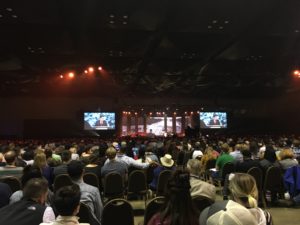
Russell Moore, President of the Ethics and Religious Liberty Commission opened up the conference with a fantastic talk in which he reminded us that “It is easy to look backward and say I would have listened to Dr. King.” Others called on us to rededicate ourselves to Christ and the mission of the church, as a core way to combat all kinds of injustices. Charlie Dates urged us to be hopeful and told us that “We shall overcome – because one dark Friday gave way to one bright Sunday.” Isaac Adams reiterated this when he said: “Because Christ is alive, one day racism will be dead.” However, he reminded us that “we are not there yet, so we must persist.”
This was my first time to Memphis, so I was sure to take advantage of some of the optional excursions here in the city, including a visit to the Stax Museum of American Soul Music, on the very site where Stax Studios once was. This place produced some of the greatest American music we know today. Memphis is geographically located in a place that enabled the genres of gospel, blues, country, and jazz to meet and form what is known as “American soul music.”

During a time of deep segregation in Memphis and much of the South, black and white musicians and producers came together beautifully at Stax Studios. But, when MLK was shot and killed here in Memphis, that quickly led to the end of Stax Studios. There became much division between whites and blacks – including here in a place where they were once transformed by music. In a video at the museum, musician Booker T. Jones said later that “If Martin Luther King had not been shot in Memphis, Tennessee, Stax Record Studios would still be here today.” It made me think about how one crazed gunman made other people put up walls against each other – even if those people had nothing to do with that tragic event.
Back at the conference, one speaker said that at the time of MLK’s death, Memphis and Atlanta were looked at as sister cities, roughly around the same size at the time. “When Dr. King died, [Memphis] became paralyzed by his death, while [Atlanta] celebrated his life.”
 We went back to downtown Memphis to have drinks at the hotel lobby bar at The Peabody Hotel, where many luminaries were staying to be here for the historic event the next day. Some in our group spotted people that included Jesse Jackson and Tom Brokaw. We then took in a few appetizers and beers at a back-alley BBQ joint called Rendezvous. Afterwards, we walked down the street to dine at a hidden restaurant called Itta Bena, located right above BB King’s blues bar and restaurant.
We went back to downtown Memphis to have drinks at the hotel lobby bar at The Peabody Hotel, where many luminaries were staying to be here for the historic event the next day. Some in our group spotted people that included Jesse Jackson and Tom Brokaw. We then took in a few appetizers and beers at a back-alley BBQ joint called Rendezvous. Afterwards, we walked down the street to dine at a hidden restaurant called Itta Bena, located right above BB King’s blues bar and restaurant.
Our dinner included a special guest, Rick Ferguson, who has led St. George’s independent school for many years. We had a lot of great conversations about how to solve problems in our own communities. Rick should know. Today, about 48% of the people in Memphis live below the poverty line. More people are living in poverty in Memphis today then when MLK was shot 50 years ago – and most of them are in the African-American community.
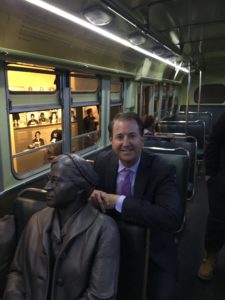
To do his part, Rick opened up a campus of the St. George’s school in the inner city and he raised money to give about 20 full scholarships each year. He has seen nearly all of his graduates go on to college. He retired a few years ago, but remains active mentoring several young men. Rick got some of these great traits from his father, Bert Ferguson, who was the manager of WDIA, the only black radio station in the South in the 1940s. Many famous black musicians played at this station. When one musician came in to play on the air, Bert asked him his name and the musician replied “Blues Boy.” He told him: we can’t call you “boy” on the air, you’re going to have to shorten that. So he did: B.B. King. Strange enough: we heard this story while sitting in the dining room above B.B. King’s restaurant.
After dinner, we went down to Silky O’Sullivan’s and listened to some dueling pianos and shared a “bucket” drink, which was absolutely gross to me. The next day we awoke and started our day back at the MLK50 conference to listen to a few more speakers. Then we ventured to midtown to have lunch at The Beauty Shop, where we had a fascinating group discussion about race in America, what we learned at the conference, and what we can do back in our communities and in our own lives.
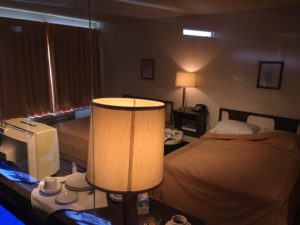
From there, I took an Uber downtown to the National Civil Rights Museum. On the way, my Uber drive was within a block of the Mason Temple church that MLK spoke at – where he gave “The Mountaintop Sermon.” There were thousands of people pouring out of that area. I heard a rumor President Barack Obama was in town and was speaking at that church on this day. I’m still not sure if he was even in the city, but people wanted to believe it.
I proceeded to the museum, which I wanted to visit. And boy did I pick the day to visit. Back in the 1980s, the Lorraine Motel was closing and some members in the community came together to raise funds to save it from being demolished. They then turned part of the hotel into what became the National Civil Rights Museum. There is a larger structure there and after walking through the history of civil rights in our country – particularly the plight that black people have had to go through since arriving on this continent as slaves and later facing segregation and other discrimination – you then walk right into rooms 306 and 307 of the Lorraine Motel. While MLK typically stayed in room 307, he stayed in 306 on his last night alive. He was shot out on the balcony outside room 306.

Earlier in the day, he was pictured there with several people including a young Jesse Jackson. As soon as I walked out of the room and back into the next room in the museum, the first person I saw was none other than the Reverend Jesse Jackson! This was such a surreal experience. I almost couldn’t believe what I was experiencing. 50 years ago to this day, Jesse Jackson was with MLK in that very room I just walked out of! And here he was. I said, “Hello Reverend Jackson” and shook his hand. He looked me right in the eye and said hello. I didn’t know what else to say. On any other day I may have asked someone like that for a photograph but it dawned on me immediately that this must be a somber moment for him – and from the look on his face, it seemed like it was.
I watched him walk by and other museum guests recognized him and greeted him. He then sat down in the room where they have “The Mountaintop Sermon” playing on the screen. I watched him as he quietly viewed the video – of a speech he was at, on the day before his friend and civil rights movement leader Martin Luther King was killed. It all came to life for me.
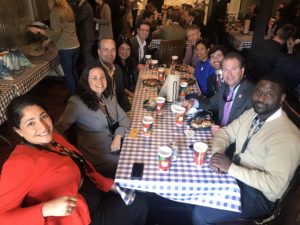
I then exited the museum through the gift shop. About 20 minutes later I walked outside and saw thousands of people outside the Lorraine Motel, where there was a staging area set up and where people had been speaking for several hours that afternoon. You can view the full event on C-SPAN.
When I walked outside I saw Jesse Jackson out on the balcony, speaking. Surreal. I then walked across the street, where the National Civil Rights Museum continues – in the building where the assassin’s bullet came from. When I was at the window looking across to the Lorraine Motel, I could still see Jesse Jackson and others with him on that balcony. Chills. This was exactly what it was like 50 years ago to the day, almost to the hour. Not much has changed in that part of Memphis, so the buildings are pretty much as they looked on that fateful day. The sun cast the same shadows, at this same hour.
I then joined up with my friends. We had been invited to a private “dinner” at 5:00pm at Central BBQ, just a block over from the Lorraine Motel, for all the speakers and conference organizers. Our friend, you see, organized the MLK50 conference, and got us into this private gathering. The bbq was delicious. We then walked back outside and joined the crowds for this solemn ceremony. After some speakers were finishing up, the clock turned 6:01 PM CT and they rang a bell there for about 2 minutes. It was an incredible moment. 50 years ago to the day, to the hour, to the minute, of the assassination of Martin Luther King, Jr., we were here at the same place, with some of the same people who experienced that day when it happened.
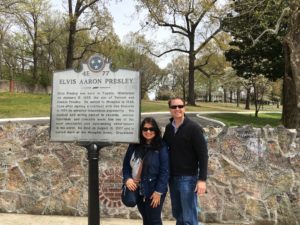
The only thing to lift our spirits after this moment was none other than Al Green performing with a choir. They sang “Precious Lord,” which just so happened to be the last song MLK had requested to be played later that night at a church service he was supposed to be attending before he was shot. It was his last request, which was played after he died 50 years ago, and played again today and sung by Al Green, who apparently leads a congregation here in Memphis. Jesse Jackson and others joined Al Green on stage and it was an uplifting moment.
We ended our day by walking back down to the Memphis Convention Center for the conclusion of the MLK50 conference. When asked “where do we go from here?” one speaker replied that he was tired of being asked this question about race relations for the past 50 years. He said, “the question shouldn’t be where do we go from here, but why haven’t we gone from here?”
That is a great question indeed. Another speaker added, “We shouldn’t feel down or depressed that there is so much work to do, but we should rejoice that we have such a privilege to take up the cross.”
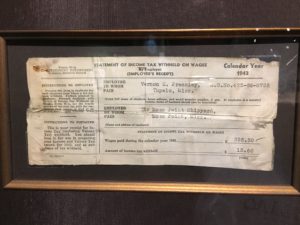
Our time in Memphis was coming to a close, but on my final day here, Thursday, April 5, my friend Ruth Malhotra and I took a tour of Graceland – the famous Memphis home of one of the most iconic figures in American history – Elvis Presley. It is a place I have always wanted to visit. In fact, when I think of Memphis, I typically don’t think of it as a place where an American icon was shot and killed in 1968. I have always first thought of Graceland.
Elvis Presley was born in 1935 in Tupelo, Mississippi. In 1948, his family moved to Memphis, and he started playing some tunes and the rest is history. While visiting the home, we came across a document that showed that in 1943, Elvis Presley’s father made a whopping $352.50 income for the entire year. In 1957, Elvis bought Graceland for $102,500 and moved his parents in with him. Shortly after, he started making movies. And shortly after that his draft card was called and he served two years in the U.S. Army. Service to his country was important for him. After all, Elvis’ story is one of those rags-to-riches stories that seems to be so emblematic of the American Dream. But what a moment that must have been when he was called away from American public life and into the service as a soldier doing his duty for his country.
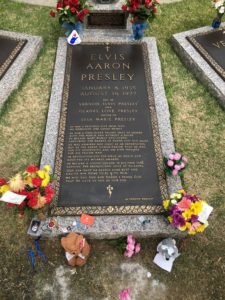
Elvis transformed American music, in perhaps the only place his style of music – that blend of American soul that developed because cultures came together despite the segregationists that wanted to keep them apart. He also transformed American culture and became a legend that lives on despite his untimely death in 1977.
It struck me when I was visiting Graceland that Elvis died at the tender age of 42 years old. “Wow,” I told my friend Ruth. “MLK died at 39 and Elvis died at 42, but they both made such a lasting impact on the world.”
I come away from Memphis completely inspired. Over the past eight months, I have visited the Churchill War Rooms in London; I have been present for so many discussions about William F. Buckley, Jr. as we at National Review Institute commemorate the 10-year anniversary of his passing; I recently visited the home of Ernest Hemmingway in Key West; and this week I was in Memphis to learn about how B.B. King got his name, how MLK’s dream lives on beyond the Mountaintop, and how a poor boy from Mississippi used his God-given talents to achieve the pinnacle of what we mean when we utter the phrase, “The American Dream.” These were great men who lived during the twentieth century – and changed the world.
This gives me hope. If we believe, we can achieve great things as individuals. But we can also achieve great things as a community. The musicians that came together at Stax Music Studios – did so in the 1950s and 1960s, when others never could have imagined people of the same races working together in the same room. Music transcended differences and when those differences came together, it formed a new sound.
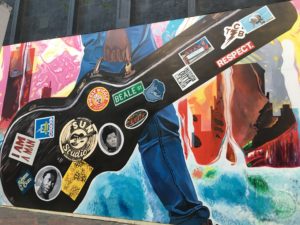 That’s the sound many of the evangelical leaders at the MLK50 conference were hinting at. God has made us all in many different shades. He’s also given us all different gifts to share with one another. One speaker said his wife told their child that God is so great that it takes many different colors to show us his beauty. May we bring those colors together, and may we bring our unique talents and ideas together to move humanity forward, all while we move towards the fulfillment we will ultimately receive in the Lord – if we do as Martin Luther King urged us to when he said: “The time is always right to do what is right.”
That’s the sound many of the evangelical leaders at the MLK50 conference were hinting at. God has made us all in many different shades. He’s also given us all different gifts to share with one another. One speaker said his wife told their child that God is so great that it takes many different colors to show us his beauty. May we bring those colors together, and may we bring our unique talents and ideas together to move humanity forward, all while we move towards the fulfillment we will ultimately receive in the Lord – if we do as Martin Luther King urged us to when he said: “The time is always right to do what is right.”
Memphis may be haunted by the ghosts of its past, but those ghosts can also be spirits that inspire us to move America forward on the shoulders of the giants who were once here. Memphis is as real as any other place I’ve experienced in America. I’m grateful I made it here to share in this important moment and experience a truly great American city.
